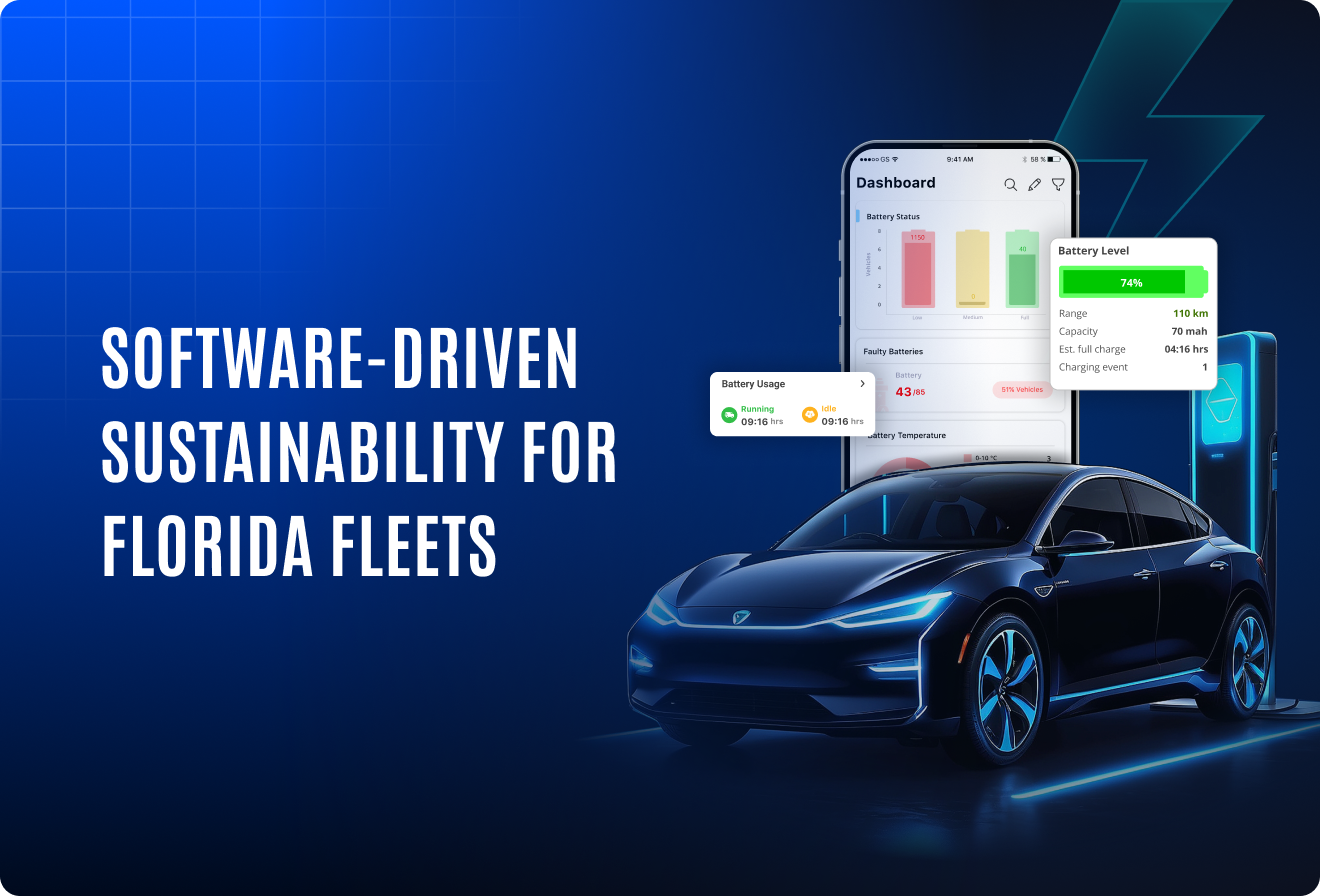Sustainable fleet tracking in Florida: Using software to meet fleet mandates

Sustainability is quickly becoming a top priority for fleets across Florida. With over 220,000 registered electric vehicles and the state ranking #2 in EV adoption across the U.S., the pressure to transition to cleaner operations is real. Programs like the Florida Department of Environmental Protection’s (DEP) Electric Vehicle Grant Program and federal Clean School Bus funding are pushing municipalities and fleet operators to take action. But this shift goes beyond just adopting EVs. Managing energy consumption, reducing idle time, and staying compliant with reporting requirements all require smarter tools. That’s why fleet operators in Florida are now turning to fleet tracking software solutions that support cleaner, more efficient, and fully trackable operations.
Challenges in running sustainable fleets across Florida
Managing a sustainable fleet in Florida isn’t just about reducing fuel consumption. It’s about staying in control across changing landscapes: from busy highways to coastal routes and storm-prone areas. Here are the real challenges fleet operators face when trying to meet clean fleet expectations:
- Lack of visibility into emissions data
Most fleets still don’t have systems that track CO₂ output per trip or per vehicle. This makes it harder to measure environmental performance or apply for green fleet incentives. - Idle time during long stops and congested city routes
Florida’s high-traffic zones, especially around Miami, Orlando, and Tampa, lead to extended engine idling. This directly increases emissions and wastes fuel or battery power. - No system to monitor EV-specific metrics
As fleets add electric vehicles, tracking charge levels, battery health, range performance, and energy consumption becomes critical, but many still rely on manual checks. - Difficulty identifying underperforming vehicles
Without automated reports, it’s hard to spot which vehicles consume more fuel or perform poorly in eco-efficiency. - Struggles with route planning for energy efficiency
Choosing routes based only on distance doesn’t account for elevation, traffic patterns, or charge station access—essential factors for sustainable operations.
How fleet management software supports sustainable operations in Florida
Fleet operators in Florida need more than policy support. They need tools that work on the ground. Here’s how fleet management software helps solve key sustainability challenges faced by local fleets:
Real-time emissions monitoring
The fleet tracking software calculates emissions based on fuel use, trip duration, and engine performance. Fleet managers can generate accurate reports and track emission trends. This supports both internal goals and compliance with sustainability programs.
Idle time detection and alerts
Florida’s traffic and weather delays often lead to long idle times. The software identifies and flags vehicles that are idling excessively. This helps reduce fuel waste or battery drain while cutting overall emissions.
EV and hybrid vehicle tracking
For electric fleets, the software monitors battery levels, charging patterns, and estimated driving range. It ensures EVs stay operational throughout the route and avoids issues like unexpected mid-route charging.
Automated efficiency reports
The platform ranks vehicles based on their energy performance. It identifies which vehicles are running efficiently and which ones consume more fuel or electricity. This supports smarter allocation of trips and vehicle upgrades.
Energy-aware route planning
Route suggestions consider more than just distance. The system factors in traffic, terrain, and energy needs to help vehicles complete trips using less fuel or battery power.
Results that matter for Florida fleets
Lower operating costs with better fuel and energy efficiency
Fleet operators across Florida have reduced fuel spend and electricity use by tracking vehicle behavior, reducing idle time, and planning efficient routes. This leads to immediate cost savings, especially for fleets running daily across high-traffic cities and long interstate stretches.
Improved compliance for sustainability programs
With built-in emissions tracking and automated reporting, fleet managers can confidently meet the requirements of state and federal sustainability initiatives. Moreover, it makes it easier to qualify for clean fleet grants and incentives available in Florida.
Smarter vehicle usage and long-term planning
The software helps identify underperforming vehicles, monitor EV battery health, and measure energy performance. This supports better decision-making around vehicle replacement, EV adoption, and asset allocation for cleaner operations.
Conclusion
For fleet tracking in Florida, sustainability is no longer just a long-term goal. It’s a daily operational need. From managing fuel and energy use to staying compliant with clean fleet mandates, software is now at the center of how fleets make progress. It brings visibility, control, and actionable data that traditional systems simply can’t provide. Whether you’re managing delivery routes through Miami or supervising electric vehicles in Orlando, the right software helps you move toward cleaner, smarter, and more efficient operations, one trip at a time.




